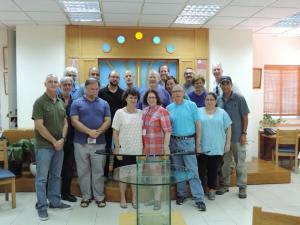This was not the first time I spent the night with her. I’ve lost track of the hotels in which we’ve slept. She in her bed and I in mine, I keenly aware of her powerful presence throughout the night.
Yet this was a first for me, and for her. She had been carried into the open plaza hours earlier by another who loves her as I do. Now it was my turn to sit with her, to guard her through the final hours before dawn.
Although we had never met, I located my two sisters in the quiet darkness. They told me how the month before, one of them had accompanied our beloved, but they were forced to leave the plaza at dawn. When our beloved’s followers arrived at the appointed hour to celebrate with her, she sat in a police station, held tightly by a woman who wanted only to protect the beloved. The faithful gathered without her, mourning her absence, determined to find another way to insure her presence next month.
This night and this day would be different. Together, we who love her would return her to the circle of disciples who would arrive in three hours.
We sat close to one another, three women surrounding a scroll that has been carried by our people for thousands of years, over deserts and mountains, across seas, a scroll whose words are inscribed on our hearts. The day before we had begun the portion that includes: “צדק צדק תרדוף you shall, you must pursue justice.” (Deuteronomy 16:20).
Every month, my sisters gather at the Western Wall to welcome the new moon. And every month there are new challenges and obstacles to the pursuit of just, equal access to this ancient sacred space.
Elul is the month of preparation for Rosh HaShanah, a month when Jews immerse ourselves in self reflection, when we consider our deeds of the past year. Every morning during the month of Elul, we sound the shofar to wake ourselves up, to look back with clarity so that we can look forward with compassion and determination. We spent a night of watching so that our sisters could welcome the month of Elul with the Torah as our guide; we accompanied her through the night so would she accompany us through this month of searching and beyond.
Soon after I arrived at the plaza, a policeman stood before us and demanded that we unwrap our precious cargo, that we reveal our beloved. When he saw the Torah, he demanded that we, and that she must leave the plaza. My companions were prepared for this challenge. They called — and woke — the Chief of Police, who told the officer to leave us alone.
It is a rare privilege to experience the arrival of a new day. We sat together, flooded with wonder as the night dissolved into light, shielding our precious legacy. The ancient rabbis, driven by a desire to praise the Holy One at every hour of day and night, were keen observers of the changes of light, and air, and atmosphere as the earth circles the sun. Trembling, we waited for the dawn, and for our sisters.
The women began arriving, donning tallitot and tefillin, exchanging glances of appreciation and concern. Some had been stopped as they entered the plaza because they carried shofarot. Yet each who arrived brought with her the conviction that it is her right, and her responsibility, to raise her voice in prayer, in song, to welcome this month.
My night of watching had come to an end; it was time to return the beloved to her followers. “For from Zion will come the Torah, and God’s word from Jerusalem.” With pride and joy, one of my sisters carried the Torah through our group, and each woman reached out to touch her.
When we unrolled the scroll, our hearts opened. On this first day of this new month, we remembered sixteen year old Shira Banki, who was murdered as she walked in the Jerusalem Gay Pride parade two weeks before. As we lifted the Torah, we called upon her as our tree of life, renewing our commitment to remain firmly planted in our pursuit of justice, in paths of peace.
Every day during the month of Elul, we conclude the morning service by sounding the shofar. Thanks to the determination of several women, and the intervention of the Chief of Police, every woman present was invited to take a turn blowing the ram’s horn. For some, it was a first opportunity to bring this ancient instrument to life. One of us held the Torah close to her heart as she lifted a shofar to her lips She joined the circle of women who welcomed Elul with cacophonous, piercing, haunting blasts that reverberated across the plaza.
May the shofar’s call wake up each of us, renewing our determination to work for justice and peace in this month of Elul and in the new year, 5776.
—
Rabbi Sue Levi Elwell is scholar in residence at Washington Hebrew Congregation. She is also the editor of The Open Door, the CCAR Haggadah (2002).

















